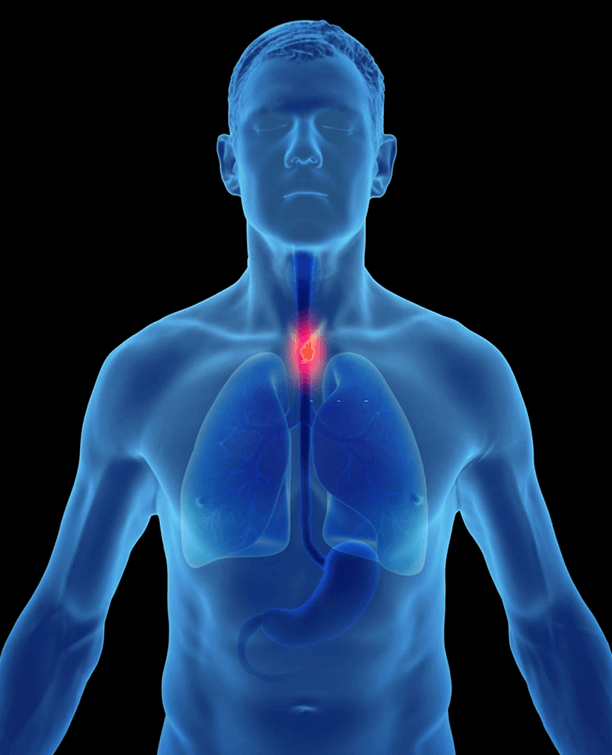Cancerous growth originating in the esophagus constitutes a major global health burden, especially in low and middle-income countries. Esophageal cancer denotes a serious condition in which malignant (cancer) cells form in the mucosal lining of the esophagus. It can develop anywhere along the esophagus and it affects more men than women. It always begins on the inner lining of the esophagus and continues to invade through the other layers of the esophagus as it grows and develops. Esophageal cancer can be largely divided into two subtypes based on microscopic features.

Esophageal adenocarcinoma is a sub-type of esophageal cancer and it starts in the cells of mucus-secreting glands in the esophagus. It mostly affects the glandular cells of the lower esophagus or Gastroesophageal junction. Obesity and chronic acid reflux induced damage are the major risk factors. Commonly seen in males, it is usually asymptomatic until it reaches an advanced stage. It occurs commonly after 50 years of age and usually presents with symptoms of dysphagia and unintentional weight loss. When this happens, cancer has often advanced locally and may have spread in the lining of the esophagus with spread into the adjacent lymph nodes or in worse cases, in distant sites.


There are different treatment options available for patients with esophageal cancer. A multimodality approach is key for a good outcome. There are various treatment approaches such as surgery, radiation therapy, chemotherapy and immunotherapy are used in combination depending on the stage of the disease. Treatment Protocol for an individual patient has finalized after a thorough review of all disease-related reports in a multi-disciplinary meet (MDT) which usually consists of specialist Surgeons, Radiation Oncologists, Medical Oncologists, Pathologists, Radiologists, and Endoscopists. Localized tumors are often treated with curative intent. Tumors that have already spread to distant sites usually treated with palliative intent which means applying measures to relieve the symptoms and improving the quality of life.

Surgery is the most frequently opted treatment for localized esophageal cancer. Usually, almost all the esophagus (except small upper portion) along with the proximal part of the stomach is removed during the surgery and this operation is termed as radical esophagectomy. This surgery can be performed by open as well as “keyhole’ (Laparoscopic/robotic) approach with an equally good outcome. The surgeon will connect the healthy part (left out proximal portion) directly to the remaining stomach. Surgery is not suitable for tumors near the upper esophageal sphincters. In the multimodality approach, surgery often combined with chemotherapy and/or radiotherapy.
Radiation therapy involves the use of high-energy x-rays or other radiations to kill the cancer cells or keep them at halt from advancing. There are two kinds of radiation therapy. External radiation therapy employs a machine outside the body and this sends radiation toward cancer. Internal radiation therapy uses needles, seeds, wires, or catheters with radioactive substances sealed in. This is then placed directly into or near cancer.
Chemotherapy uses drugs to kill the cancer cells or stop them from dividing. When chemotherapy is ingested through the mouth or the injected into the vein, the medicine enters into the bloodstream and attacks the cancer cells throughout the body. This is called systemic chemotherapy. Chemotherapy is administered by Medical oncologists based on the type and stage of cancer.
Chemoradiation employs the use of both chemotherapy and radiation therapy to increase the effects of both kinds of treatment. Based on the type and stage, Doctors will suggest a course of treatment, which may have side effects. Once the course of the treatment is done, regular check-ups and follow-up tests are to be continued to monitor the condition and ensure cancer did not recur or worsen.


Our gastroenterology services treat all kinds of digestive system disorders. Book an appointment now with our GI Specialists and have the best team of doctors treating you!